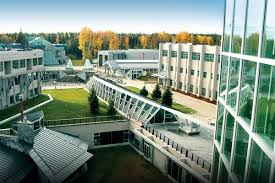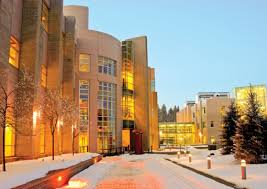University of Northern British Columbia

University of Northern British Columbia
Location: Prince George, British Columbia, Canada
Foundation Year: 1990
Type: Public
Tuition Fees: 23,985 CAD per 30 credits
The University of Northern British Columbia (UNBC) is a government-owned educational institution in Canada that has been active in scientific and academic work since the early 1990s. The young UNBC consists of five campuses, which are located in Prince George, the main one, Prince Rupert, Terrace, Quesnel, and Fort St. George. All of them serve the region that includes the traditional territories of numerous diverse First Nations. In 2007, the University of Northern British Columbia was recognized as Canada’s Green University for its teaching, research, energy initiative, and day-to-day sustainability.
The University of Northern British Columbia is proud to be a member of the University of the Arctic International Cooperative Network, the Association of the Commonwealth Universities, the International Association of Universities, the U Sports, the Canadian Bureau for International Education. It is also worth mentioning, that UNBC is often ranked as the best university of its size in Canada by Maclean's Magazine.
UNBC is a research-intensive university with a wide range of programs. It offers more than sixty Undergraduate programs and also a great number of Graduate ones. In 1994, the University of Northern British Columbia began offering its first Master’s Degree programs, and in 1996 it launched its own Ph.D. programs. Today UNBC boasts 28 modern Master’s Degree programs and three Doctoral programs.
The University of Northern British Columbia is proud to provide a wide range of Bachelor Degree programs: Bachelor of Arts, Bachelor of Commerce, Bachelor of Education, Bachelor of Health Sciences, Bachelor of Science, Bachelor of Applied Science, Bachelor of Science in Nursing, Bachelor of Planning, Bachelor of Social Work, and some Independent Minors.

The choice of UNBC Master’s programs covers the fields of Business Administration, Development Economics, Disability Management, Education, English, First Nation Studies, Gender Studies, Health Sciences, History, Integrated Wood Design, Interdisciplinary Studies, International Studies, Mathematical, Computer, Physics and Molecular Studies, Biochemistry, Chemistry, Natural Resources, Environmental Studies, Geography, Outdoor Recreation, Conservation and Tourism, Biology, Environmental Science, Forestry, Nursing, Political Science, Psychology, Social Work. Graduate Certificate programs available at UNBC include Leading for Learning, Indigenous Child and Youth Mental Health, and Special Education. UNBC`s Post-Baccalaureate programs are Curriculum and Instructional Studies and Montessori Education courses. The University of Northern British Columbia has three Doctorate Degree programs in Health Sciences, Natural Resources and Environmental Studies, and Psychology.
UNBC has designed a unique transition program for incoming international undergraduate students - uTREK. It combines a possibility to earn university credits toward a chosen degree with the effective development of English-language skills. What is also important, the students are enrolled in a mix of undergraduate classes, with their uTREK peers and other UNBC students. The best uTREK instructors guarantee all the needed support and guidance for the quick and successful immersion of newcomers to Canadian academic and cultural life. The program lasts for three consecutive semesters, and it fully complies with all the requirements of Immigration, Refugees, and Citizenship Canada.
Graduates of the uTREK program, who progress onto degree completion are eligible for the Canadian Post-Graduate work permit. The Academic Success Center at the University of Northern British Columbia also helps international and exchange students and matches them with writing, content, or study skills tutors. Math, Physics, Stats support services are also available.
The UNBC Outbound Exchange Program offers its current students a chance to travel and study at a foreign university for the cost of a semester’s tuition and fees. UNBC is proud to have partnership agreements with 34 institutions in 18 different countries that include Australia, China, Denmark, Finland, France, Germany, Japan, New Zealand, Norway, Russia, Scotland, Spain, Sweden, and Switzerland.

The Continuing Studies program at the University of Northern British Columbia offers a wide range of courses for learners of all ages through campuses in Prince George, Quesnel, Terrace, and Fort St. John. The choice of courses covers the area of General Interest, Health, and Safety, Intermediate Algebra, Language and Writing, Mental Health and Wellness, Natural Resources, Northern BC Adventures, Professional Development, Project Management, Supervisor Fundamentals, TESOL, Web, Technology and Design, Wildlife Dangerous Tree and many other courses. Online programs are also available for a choice.
The University of Northern British Columbia is proud of its Jeffrey R. Weller’s Library, which mission is to become the intellectual life center of the institution. The library welcomes all UNBC’s communities to access information, share different views, work together, conduct research, learn, and grow intellectually. It is also worth mentioning, that UNBC has over sixty other academic, cultural, social, and service clubs that can satisfy all the students` needs and interests.
The UNBC Health Service works with students to manage health problems, obtain information on relevant health and lifestyle issues, participate in the promotion of a healthy lifestyle, and manage changes to healthy lifestyles while studying at university.
Admissions are usually based on the applicant`s previous academic records. Admission requirements to UNBC vary depending on a chosen program and can be divided into admission requirements for Undergraduate, Graduate, and Continuing Studies programs. English is the main language of instruction and communication at UNBC. Candidates whose native language is not English, regardless of citizenship or country of origin, must provide evidence of English language proficiency before admission. Acceptable evidence of English language proficiency includes the following tests: TOEFL, IELTS, CAEL, CELPIP, MELAB, PTE. Other program-specific admission requirements to UNBC depend on the subject area, level, and course.
UNBC’s campus housing is more than just a place to live, but a comfortable, safe, and supportive community. The buildings offer fully furnished apartments, located less than five minutes from the center of the campus. The fully furnished apartment suites have a kitchen, living room, separate bedrooms with a bed and table, and shared bathrooms. Each building has such amenities as Wi-Fi, laundry facilities on each floor, and common areas and study halls.
It is worth mentioning, that all International Undergraduate and Master’s Degree students are required to pay a 7500 CAD admission deposit. The Undergraduate Tuition Fee for international students is 23,985 CAD per 30 credits, the Graduate Tuition Fee for international students is 5,145 CAD per year (three terms).
Regards,
International Experience Club

